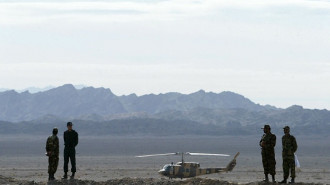Libya prime minister refuses EU plan for refugee centres
Libya's prime minister said on Friday he would not allow the EU to set up asylum processing centres in his country, in a new setback for European leaders hoping to stop arrivals on their shores.
"We are strictly against Europe officially placing illegal migrants who are no longer wanted in the EU in our country," Fayez al-Sarraj said in an interview with German daily Bild.
"We also won't agree on any deals with EU money about taking in more illegal migrants," he vowed, adding that European leaders should instead put pressure on migrants' origin countries to stop them embarking on their journey in the first place.
During a fractious summit in June, EU leaders agreed to set up "disembarkation platforms" outside the bloc to process migrants.
But no country has so far offered to host a reception centre, where authorities would distinguish between irregular migrants and asylum seekers admissible into the EU.
Morocco has already given a flat no to the plan, while Tunisia previously rejected it.
Twitter Post
|
Albania has also ruled itself out with Prime Minister Edi Rama saying that such centres mean "dumping desperate people somewhere like toxic waste that no one wants".
Meanwhile, Sarraj also threw out claims from Spanish rescue group Proactiva Open Arms that the Libyan coastguard saved other migrants on board a dinghy but not two women and a little boy.
The child and one of the women were found dead when Spanish rescuers arrived, but the other woman has been saved.
"These are outrageous accusations, and they are not true. Our coastguards have already clarified this," said Sarraj, who heads the UN-backed unity government in Tripoli.
"Every day, we save hundreds of people on the coast of Libya. Our ships are active non-stop," he said, stressing that Tripoli needs more technical and financial aid to improve its rescue missions.
Under a controversial deal with the EU, Libyan coastguards intercept migrants trying to cross the Mediterranean. But the UN has slammed the policy as "inhuman", noting that the migrants are simply brought back to "horrific" detention centres in Libya.
![Fayez al-Sarraj [Getty] Fayez al-Sarraj [Getty]](/sites/default/files/styles/large_16_9/public/media/images/97130346-3053-4A5D-82BC-FED0EF1169D4.jpg?h=d1cb525d&itok=LZw94KGy)
![Palestinians mourned the victims of an Israeli strike on Deir al-Balah [Getty]](/sites/default/files/styles/image_684x385/public/2024-11/GettyImages-2182362043.jpg?h=199d8c1f&itok=xSHZFbmc)


![The law could be enforced against teachers without prior notice [Getty]](/sites/default/files/styles/image_684x385/public/2178740715.jpeg?h=a5f2f23a&itok=hnqrCS4x)
 Follow the Middle East's top stories in English at The New Arab on Google News
Follow the Middle East's top stories in English at The New Arab on Google News
![Fakhrizadeh [AFP] Fakhrizadeh [AFP]](/sites/default/files/styles/image_330x185/public/media/images/774C39F7-8F7A-4D67-B998-27D102FCB4A7.png?h=d1cb525d&itok=j9eGvunV)

